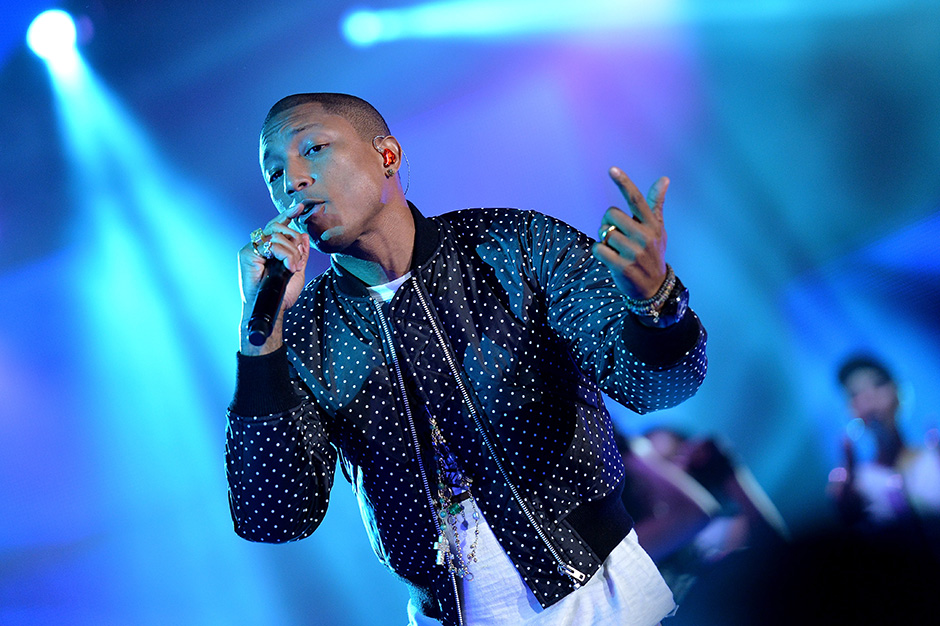Release Date: March 03, 2014
Label: Columbia
The son of a schoolteacher, Pharrell Williams loves assignments. How else to explain why one of the most audacious songs attached to his name was crafted for a cartoon?
I’m not talking about “Happy,” the refreshingly joyous yet slyly sophisticated anthem currently topping the charts, but initially heard in last summer’s Despicable Me 2. I mean 2010’s “Fun, Fun, Fun,” from the first movie. Here’s a guy behind countless hits for hip-hop’s elite — club bangers both rugged and dexterous, like the arm muscles of triple-cartwheeling gymnasts — and he flips a 180 and crafts a song so giddy that it makes the surf-era Beach Boys sound like sad sacks. It’s like mainlining a rainbow.
That lighter-than-helium vibe is all over G I R L, the most audacious milestone in the Neptunes/N.E.R.D. icon’s already storied career. As suggested by its title, Pharrell’s second solo album follows last year’s monster smashes for Daft Punk and Robin Thicke with a full-length both unabashedly feminine and neatly spaced-out.
For starters, he atones for the most prick-headed aspects of “Blurred Lines” by celebrating female orgasm in “Gush”: “I don’t know what’s come over me,” he sings with a wink, once again sophisticating his funk with cross-generational appeal. He also vows to “light that ass on fire,” but does so amid luxurious, Chic-style strings and guitar spangles that supply the R-E-S-P-E-C-T his lyrics fail to deliver.
Almost every other cut is an improvement in that regard, though, and that’s news. Having both married his longtime girlfriend and turned 40 last year, Williams’ newfound maturity flourishes here, but not in the heavy-handed way that often plagues rock’s vets. Instead, his touch has grown far lighter and his spirit even more childlike than before. “We cannot help who we’re attracted to / So let’s all dance and elevate each other,” he sings in the first verse of opening cut “Marilyn Monroe,” after a florid orchestral intro drops to sudden silence and he utters the album’s one-word manifesto: “different.”
Williams knows that a mix of the masculine and the feminine is crucial to pop even more so than hip-hop, and his balancing act here is worthy of Frank Ocean, Adam Lambert, Mika, and Scissor Sisters, to name four of his production benefactors who presaged his current transformation. Despite a few gratuitous girl‘s, he and Justin Timberlake seem to be singing directly to and not just with each other on “Brand New,” and that’s brilliant: “You are the feeling I’m jamming to / Like the tag’s still on me / Jumpin’ ’round in ya bag,” they trill as a ping-pong guitar riff conjures buoyant early Jackson 5.
But here’s the thing: Although this album draws from bygone rhythmic pop ‘n’ soul, never does it get out-and-out retro. If there are samples, they’re undetectable, and Williams similarly steers clear of obvious recreations like the Marvin Gaye cop in “Blurred Lines.” Instead, there are subtler allusions, like the distant operatic warbling in “Gust of Wind” that suggests Quincy Jones’s audio trickery, or those sitar-style guitar bits in hidden track “Freq” that evoke Thom Bell’s work with the Stylistics. Rhythms and tempos fluctuate drastically from track to track without ever lapsing into disco or hip-hop or EDM clichés; instead, the beats percolate in Pharrell’s own polyrhythmic mode while steering clear of what he’s done before. Nobody raps.
Instead, there’s the melodic and harmonic and tonal complexity that hip-hop too often represses. Williams has long distinguished himself by dropping a suddenly lush and well-articulated bridge between even his most mundane verses and choruses; that’s his songwriting signature, and it’s been adopted throughout 21st-century R&B. But now nearly every element of his compositions draw from multi-hued jazz chords — they’re the reason why “Happy” radiates good cheer every time the background harmonies enter, why everything feels alright and aligned in the universe as the choir bleeds color and vitality across the chorus.
Those glowing chords and similarly luminous string arrangements — courtesy Hollywood’s Hans Zimmer, his associate Nick Glennie-Smith, Zappa/Captain Beefheart graduate Bruce Fowler, and violin virtuoso Ann Marie Calhoun, the latter receiving the album’s sole non-Williams co-songwriting credit, despite prominent vocal cameos from Timberlake, Alicia Keys, Miley Cyrus, and Daft Punk — are the backbone of G I R L‘s gorgeousness and grace. Check the frisson that sparks when the restlessness of the strings in “Gust of Wind” rub up against the assuredness and gratitude of the groove. As for the vocals, Williams has always been distinctive, but here he’s singing far sharper and articulating far deeper feelings than he previously dared: “Mothership other, can I stow away?” he asks of his beloved, neatly layering love, his race, and his identification as a nontraditional male in one tiny line.
That’s what G I R L is about. Williams long ago mastered grooves, and sounds, and flash, but he didn’t need to be a solo star, because he said everything he needed to say through his assignments, through his wild-style productions for everyone from Kelis to Schoolboy Q. But his mastery of those things is evident here, resulting in the most booty-shaking, speaker-twinkling, glitz-intensive pop-soul record to come down the turnpike in years, out-dazzling even kindred efforts by Timberlake, Bruno Mars, and Miguel. The difference is his newfound sense of purpose. That stuff about elevating each other through dancing? He really means it, and embodies it here via the music’s sheer exuberance, the softness and sunshine soul temporarily forgot.





